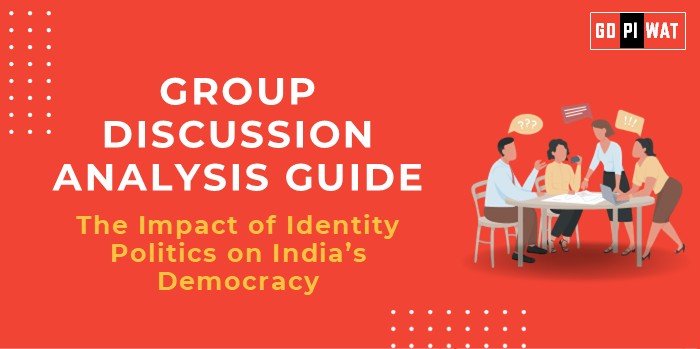📋 Group Discussion (GD) Analysis Guide
🌐 The Role of Identity Politics in Shaping India’s Democracy
🧠 Introduction to Identity Politics and Its Relevance
Opening Context: Identity politics, rooted in the assertion of group-based identities, has a profound impact on democracies worldwide. In India, a nation with diverse ethnicities, religions, and languages, it plays a pivotal role in shaping political discourse.
Topic Background: The concept emerged prominently in India during the mid-20th century with movements based on caste, religion, and linguistic identities. While it has empowered marginalized communities, it has also been criticized for fostering divisiveness and vote-bank politics.
📊 Quick Facts and Key Statistics
- Caste-Based Reservations: Over 49% of public sector jobs and education seats are reserved for Scheduled Castes (SCs), Scheduled Tribes (STs), and Other Backward Classes (OBCs) under constitutional provisions.
- Religious Representation: Muslims constitute 14.2% of India’s population but have a lesser representation in parliament (4.9% in Lok Sabha, 2024).
- Linguistic Diversity: India has 22 official languages; linguistic identity movements have influenced state reorganization and policy formation.
- Electoral Impact: 52.4% of voters in 2024 cited caste or religion as a significant influence on their decisions (Lokniti-CSDS post-poll survey).
🔑 Stakeholders and Their Roles
- Political Parties: Utilize identity as a strategy for vote mobilization; promote specific group interests.
- Marginalized Communities: Advocate for representation and equality; seek policy measures to address systemic inequities.
- Civil Society Organizations: Facilitate dialogue on identity-based issues; monitor misuse of identity politics.
- Government Institutions: Responsible for balancing representation with governance efficiency; uphold constitutional values.
🏆 Achievements and Challenges
Achievements:
- Empowerment of Marginalized Groups: Policies like affirmative action have improved socio-economic indicators for SCs, STs, and OBCs.
- Cultural Preservation: Linguistic and regional identities have found a voice in policymaking, leading to preservation of heritage.
- Democratic Participation: Increased voter turnout among minority communities due to targeted outreach.
Challenges:
- Polarization: Identity politics often deepens communal or caste-based divides, leading to social unrest.
- Vote Bank Politics: Focus on group-specific issues can overshadow national development agendas.
- Global Comparison: While identity politics has strengthened multicultural democracies like Canada, its divisive effects in India highlight governance inefficiencies.
Case Studies:
- The Mandal Commission (1990): Drastic societal impact through implementation of 27% OBC reservation.
- Ayodhya Verdict (2019): A landmark case reflecting the tension between religious identity and constitutional values.
📋 Structured Arguments for Discussion
- Supporting Stance: “Identity politics has been instrumental in reducing historical injustices and increasing representation.”
- Opposing Stance: “Over-reliance on identity divides society, leading to governance inefficiency.”
- Balanced Perspective: “While identity politics has empowered marginalized groups, unchecked focus risks undermining national unity.”
✅ Effective Discussion Approaches
- Opening Approaches:
- “Identity politics in India reflects the dual challenge of empowerment and division. Is it a democratic necessity or a polarizing force?”
- “With caste and religion shaping voter behavior, how can India ensure identity politics strengthens rather than fragments democracy?”
- Counter-Argument Handling:
- Acknowledge benefits of representation but emphasize risks of excessive polarization.
- Highlight global best practices, like Canada’s multicultural model, to propose balanced solutions.
📌 Strategic Analysis of Strengths and Weaknesses
Strengths:
- Enhanced representation
- Policy inclusivity
- Cultural preservation
Weaknesses:
- Divisiveness
- Governance inefficiencies
- Misuse for short-term electoral gains
Opportunities:
- Inclusive growth
- Multicultural policy frameworks
- Youth engagement
Threats:
- Sectarian violence
- Erosion of national identity
- Electoral manipulation
📚 Connecting with B-School Applications
- Real-World Applications: Case studies on public policy, diversity management in organizations.
- Sample Interview Questions:
- “Discuss the role of caste in Indian electoral politics.”
- “How can identity politics balance empowerment and governance?”
- Insights for B-School Students:
- Understand political decision-making and stakeholder dynamics.
- Explore strategies to promote inclusive policies in businesses.


